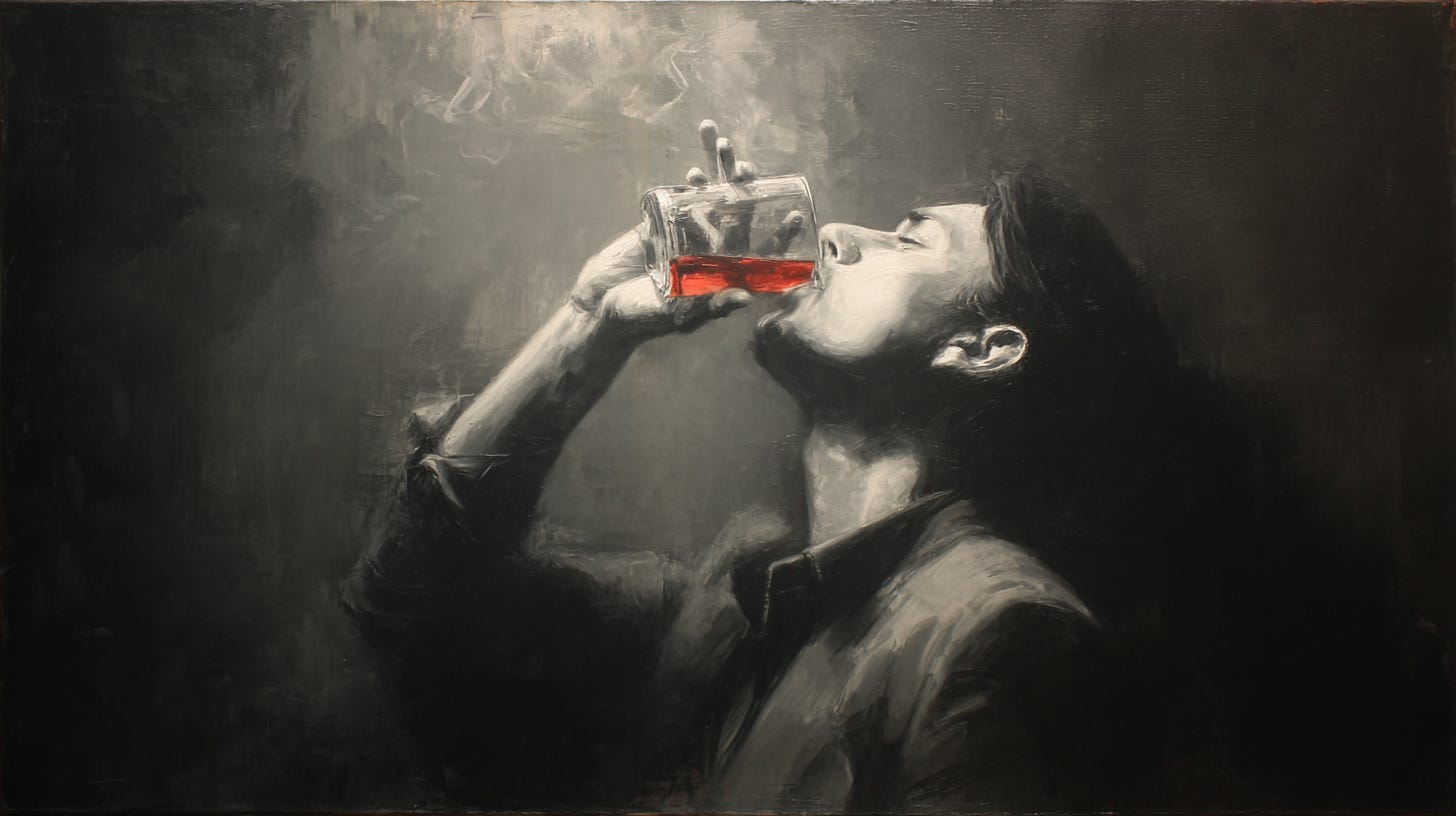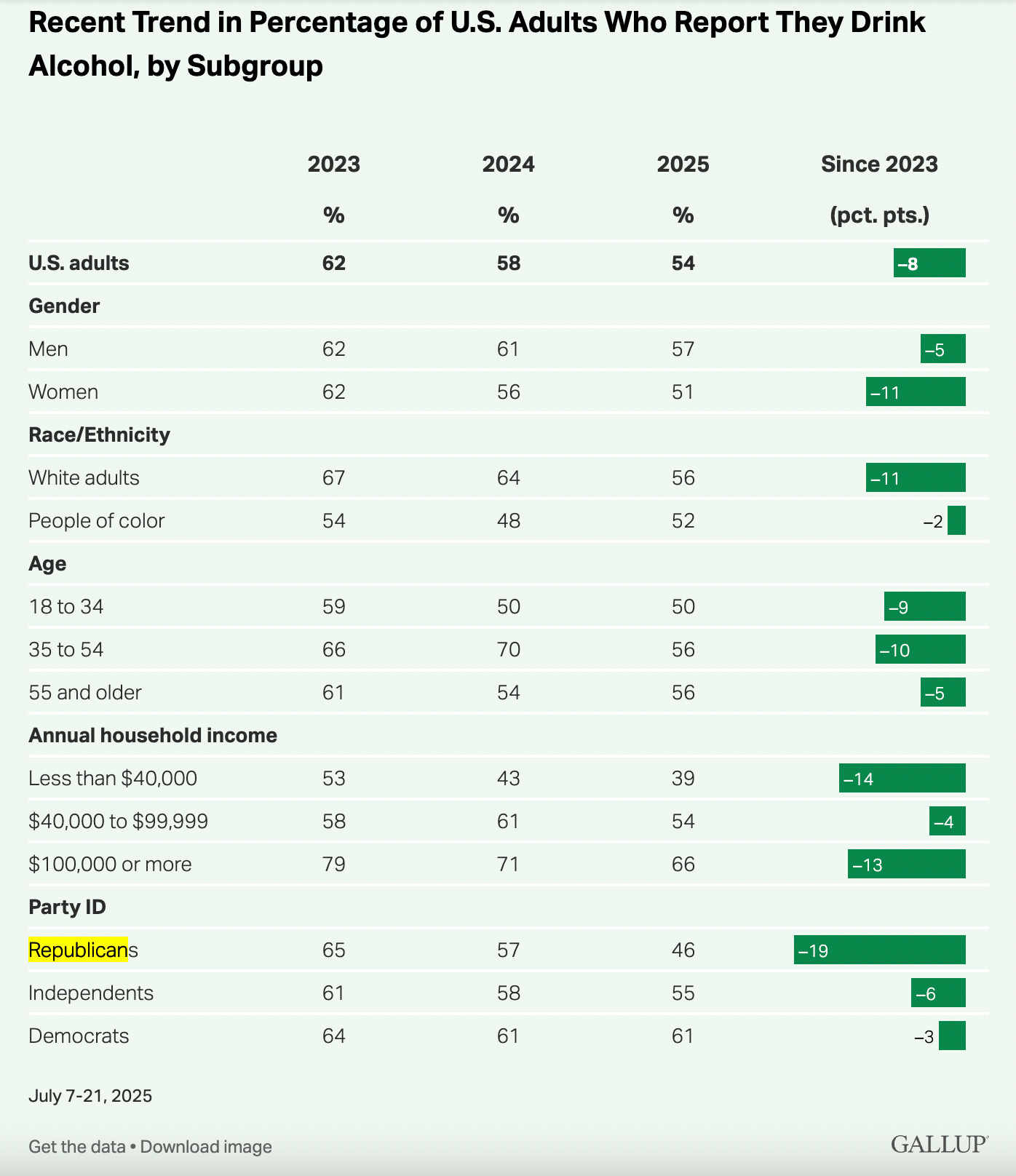Is drinking the new smoking? Yes, but....
The new Gallup poll is big news, but NPR and PBS didn't report all of it. 🤔
Editor’s note: This may be the only time you see an emoji on AGING with STRENGTH. Please enjoy it.
The first time I heard the cliché “Sitting is the new smoking” was Tuesday, and I thought, well, that’s pretty clever. Turns out, the phrase has been around since 2010 and has been a popular media trope for more than a decade. I don’t get out much.
Today, I’m happy to report that sitting is no longer the new smoking, because drinking is. According to a new Gallup poll that you may have heard or read about this week, the ratio of Americans who say they drink has fallen to 54 percent, the lowest rate of alcohol consumption in the poll’s 90-year history.
Even among those (of us) over 50 who still drink, they (we) are drinking less and less often. The reasons are likely myriad and may include:
a growing public awareness that any amount of alcohol is damaging to health, especially in midlife and beyond
drinking is more expensive than ever; paying $18 for a martini at a bar makes a $2 seltzer on the couch a lot more attractive for many people on a tight budget
Low-dose cannabinoids (either psychoactive, like THC, or non-psychoactive, like CBD), have become increasingly available and affordable alternatives to drinking, and don’t produce hangovers for most people
Zero-alcohol beers and wines no longer taste like farm runoff.
This is good news for everyone except Big Alcohol and Blue Zones LLC, the marketing monstrosity I wrote about months ago, which still continues to push — along with its branded wine label — the debunked idea that daily drinking promotes longevity.
That said, there’s more to this “America drinks less” story than some big media names are reporting. Why that is so is, itself, an interesting story.
What the media didn’t report about drinking in America now
Look at the chart below, from the Gallup web story on its drinking poll results, and what stands out to you?
My yellow highlight may have tipped you off: The biggest drop in alcohol use, among all demographic cohorts of Americans that Gallup identified, is among Republican Americans, well more than double the national average. And, conversely, the second-smallest reduction in drinking among any American demographic cohort is among Democrat Americans.
(The huge income differences in the chart are also pretty revealing. As is the fact that people 55 and older showed the smallest reduction in drinking since 2023. Go figure.)
Note: We’re not going to get political here. But we are going to get “media.”
I’d wager that the reasons for this sharp divergence in drinking among Americans of different (nowadays, some might say opposite) political persuasions would be an utterly fascinating story to dive into, given how riven our national politics are.
Curiously, neither the NPR story nor the PBS article on the new Gallup poll mentioned the political drinking divide. I say curious because many other national media that covered the Gallup news, including the Washington Post, Time, Newsweek, U.S. News & World Report, Axios, Business Insider, Esquire and Forbes did make that point. Even Fox News reported the “Republicans drink more” story. (Notably, PBS — like the big three TV networks — simply ran the Associated Press article, which didn’t mention the political angle. NPR, on the other hand, wrote its own story, with three original expert interviews, that covered the age-group and gender differences in drinking rates, while staying silent on the political-party aspect.)
So what?
Given that Congressional Republicans recently voted to rescind $1.1 billion in previously allocated funds for the Corporation for Public Broadcasting, which supports NPR and PBS, one might understand the two new organizations’ desire to avoid making a point about a major shift in specifically Republican-American culture.
Except that doing that would be a complete failure of journalism. Avoiding news for political reasons is not how responsible, courageous media functions. It’s how tin-pot banana republic newspapers, such as the Pyongyang Daily News, for instance, operates. You don’t avoid facts because of who or what they may call attention to, either positively or negatively.
I have absolutely no evidence that NPR and PBS editors avoided — passively or actively — the story’s huge, obvious and rather compelling political angle. But also, as a former investigative reporter for The New York Times (whose story on this topic also failed to mention the political drinking divide), I know what a dead rat behind the refrigerator smells like. (Quite literally: At my college fraternity, a whole week went by before we found the nauseating source of that odor.)
Regardless of one’s political persuasion, the last thing anyone in this country should want is for otherwise respectable and responsible national media organizations to censor themselves because someone holding the purse strings might not like the news.
What do you think? Leave a comment.
Tomorrow, it’s back to our regularly scheduled programming.





I cannot speak for PBS but as a retired NPR journalist (33yr career there) I doubt there was any self-censorship in the failure to report the political stat. The figure is fairly deep in the weeds. It was most likely a time limitation.
Isn’t the difference between low-income and high-income groups much more interesting? Seems the difference in political backgrounds might be explained by more low-income groups identifying as republican. The trends also move quite a bit per year, changing direction in different years, is the sampled group sufficiently large/well sampled?